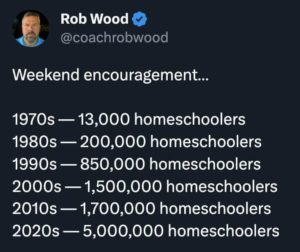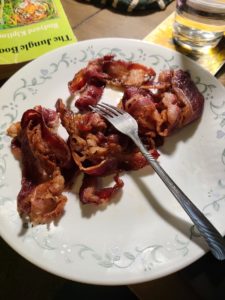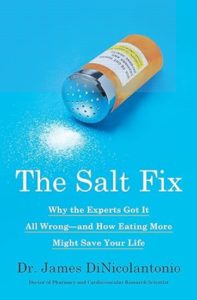And other stupid things smart people think.
Got into a little bit of a discussion with “the smartest man in the world” on Gab, whose childhood was miserable, he thinks, because he was poor. He wishes poor people wouldn’t even have children.
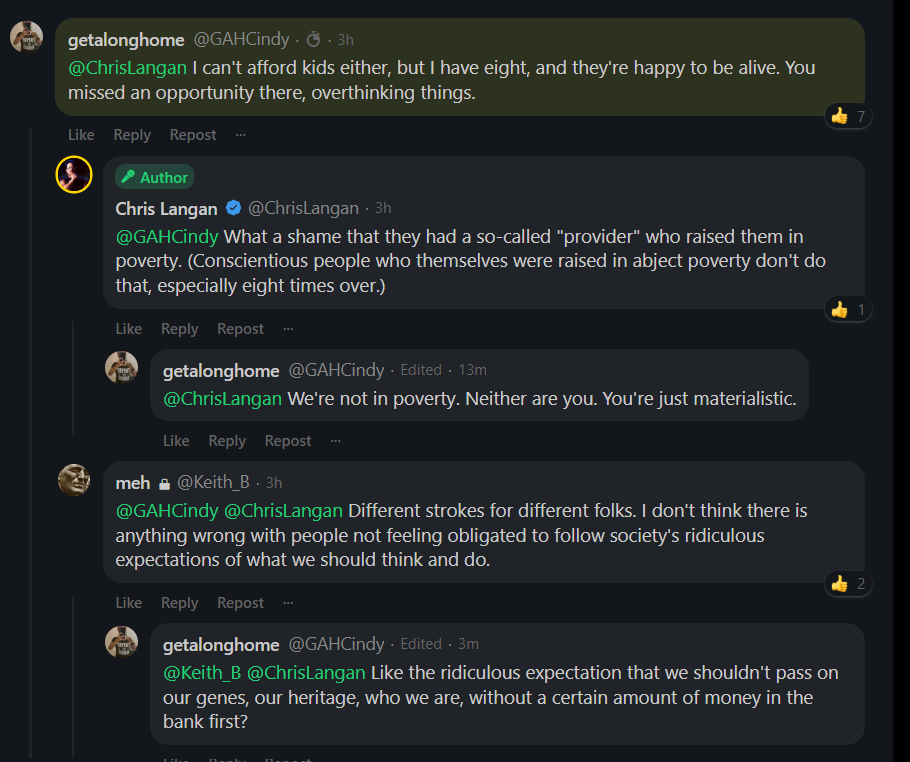
Of course, since I’m a Christian, I have a different take on it: Blessed are the poor.
Since I don’t have a lot of time to write a new post, and I already addressed this more than a decade ago, I thought I’d just drop a chapter from my book, ConDeceived, which was really just a collection of blog posts on the same topic, to do the rest of my arguing for me. Self-plagiarism FTW! Here you go:
Lie: Children are too Expensive
Those darn kids sure are expensive, aren’t they? Too expensive to have!

This comic from xkcd just happened to come to my attention the day after I found out I was carrying our fifth child, who at the time was about the size of a sesame seed, and for whose prenatal care and delivery costs we appeared to be woefully short. How that shortfall came to be is a long story. Suffice it to say that we were not feeling flush.
After rearranging some priorities, working to earn a little extra money, and eating a few more meals of beans and rice to bulk up our savings against the day of delivery, we found that God didn’t even need our help. The money was there, and then some! If we’d made a “decision” based on whether our bank account looked flush, we’d be short one very energetic bundle of hazel-eyed joy. And we’d probably still have less money, because we wouldn’t have gone into emergency mode to cover the looming (imaginary) financial difficulty.
The financial burden that children impose upon their parents is a lie our culture continually tells, and even Christians fall for it, hook, line, and sinker. I’m not going to pretend that it costs nothing to feed our children, but I will say that the financial costs aren’t anywhere near what “experts” tell us. In fact, chances are that you’re going to end up about as wealthy as you were going to be whether you add kids into the mix or not. Wealth, especially in a country like ours, has less to do with how many mouths you’re feeding and more to do with your willingness to work, your skill-set, and your ability to save rather than spend. In fact, a quick search of the web reveals several studies that have shown that men tend to earn more once they’ve added children to the home. Nothing lights a fire under a man’s behind like having to feed a houseful of people. I can add from personal experience that stay-at-home motherhood can be quite a spur to frugality, as well.
Practically everybody is familiar with the Duggars—Jim Bob and Michelle, and their 19 kids—through their reality television show “19 Kids and Counting.” I’ve only watched a few episodes, so I don’t know very much about them. But you know what? They don’t look poor to me. Of the large Christian families that I know personally, some are wealthy, and some are decidedly not. They are all, however, fed, clothed, and lacking nothing essential. Maybe they don’t have anything fancy, or their shoes are a bit scuffed, but they are taken care of. I also know families with two kids, or none, who are in dire financial straits.
Financial peace in the home has more to do with a couple’s relationship with money than it does with the number of people requiring new shoes at any given moment. Knowing this, and having lived it, I really don’t see how we can blame our children for our financial situations. Family size has very little to do with the long-term wealth of a family.
But what if it did?
Let’s stipulate that having children does, in fact, mean you’re going to be less wealthy. Pretend that every child you add to your family really does remove hundreds of thousands of dollars from your future purse. Does that mean preventing them from even coming into existence is the best way to secure your future?
“Do not lay up for yourselves treasures on earth, where moth and rust destroy and where thieves break in and steal, but lay up for yourselves treasures in heaven, where neither moth nor rust destroys and where thieves do not break in and steal. (and, I might add, where the Fed does not inflate away–ed.). For where your treasure is, there your heart will be also.
–Matthew 6:19-21
Christians, these are the only treasures you can take with you!
Our culture sets parents against children, and present children against future ones, telling us that they’re a money-suck, and the only thing standing between us and a comfortable retirement. (And isn’t comfort the real purpose of living?) Even in the church, financially strapped parents are led to believe that their money troubles are partly due to the existence of their children and advised against having more…unless the money is there.
Is this how God thinks of children? Does He think of them as consumer goods, to be “bought” only if we can afford to “pay for” them?
In God’s economy, children are wealth! Look at just a few of the things the Bible has to say about children:
Behold, children are a heritage from the LORD, the fruit of the womb a reward. Blessed is the man who fills his quiver with them! He shall not be put to shame when he speaks with his enemies in the gate.
—Psalm 127:3-5
You shall be blessed above all peoples. There shall not be male or female barren among you or among your livestock.. —Deuteronomy 7:14
Blessed is everyone who fears the Lord,
who walks in his ways!
You shall eat the fruit of the labor of your hands;
you shall be blessed, and it shall be well with you.
Your wife will be like a fruitful vine
within your house;
your children will be like olive shoots
around your table.
Behold, thus shall the man be blessed
who fears the Lord.
The Lord bless you from Zion!
May you see the prosperity of Jerusalem
all the days of your life!
May you see your children’s children!
Peace be upon Israel!
—Psalm 128:1-6
And when Esau lifted up his eyes and saw the women and children, he said, “Who are these with you?” Jacob said, “The children whom God has graciously given your servant.”
—Genesis 33:5
Children are not consumer goods. They are people made in the image of God, and a heritage from the Lord.
We Christians should allow the World to go ahead and worry about how much it “costs” to have kids. What they have on this Earth is all they’ll ever have, so it’s natural for them to plan accordingly. We who know better ought to look forward to rejoicing in the fruits of our labor when we are old—a living legacy of Godly children.
At the end of my life, if God wills that I should live to old age (which, given my driving abilities, seems like a longshot), I will probably die in somewhat less well-appointed circumstances than I would have if I’d focused more on storing up treasures here on earth. That could be in part because of the amount of money I’ve “wasted” raising my children–people whose existence I could have prevented with just a quick visit to the doctor.
It is vaguely possible that the cost of my kids’ education, clothing, and healthcare would have been put into a savings account if those little people just didn’t exist. But those people will be there when I’m old, and when I die they’ll be sorry I’m gone. I doubt whatever is left of my retirement fund will feel so strongly about my passing.
Who is your provider?
Of course, we do have to pay for things like food, shelter, and clothing for all these new bodies we keep adding to the census every 20 months or so, don’t we? Have you ever worried about how you’re going to feed your next baby? Or maybe it’s your neighbor whose family size has you worried. There seems to be a lot of that going around these days.
An older lady—the greeter at Walmart, actually—once stopped me and asked me how “all these young mothers” thought they were going to pay for “all these” kids. (I’d have borne the insult gracefully if I’d thought she meant I looked too young to know what I was getting into. Alas, she didn’t seem to be including me in her definition of “young mothers.”)
If it were just one lady whose age appeared not to have fostered wisdom, I probably wouldn’t bother writing about it. But it’s not just her. Daily, internet searchers come to my website wondering why Christian families are having children they can’t afford, along with Christians who are wondering how they’re going to afford the blessings God is sending their way. Strangers on the street tell me that they don’t understand how I can afford my kids. My own grandmother wants me to stop having kids because they cost too much! (And they have never cost her a dime!)
Better is a dinner of herbs where love is than a fattened ox and hatred with it.–Proverbs 15:17
What these questioners overlook is the fact that we’re talking about Christian families.
Christianity is the key. Searchers who ask why Christian families think they can afford so many children answer their own question. I propose that the reason that they can afford the large family lifestyle is because they are Christians.
Stay with me for a moment. I am not saying that Christians are wealthier, smarter, or somehow less expensive to feed and clothe than non-Christians. We come from all walks of life, after all. However, the Bible does provide a great deal of financial wisdom for those who are empowered by the Holy Spirit to take advantage of it. The rest of the world kinda-sorta knows these things, as the large number of secular personal finance blogs indicates, but Christians often literally take their faith to the bank.
People who take God’s word seriously concerning family structure and His love for their offspring are equally likely to believe biblical truths about earning, spending, borrowing, giving, and saving. Believing these things, they are more likely to live by them, however imperfectly, than those who haven’t heard the word of God. Not every large family has the best grasp on these principles, it’s true, but it has been my experience that larger Christian families are much more likely to be debt-free and financially independent than even most smaller Christian families or childless couples.
In fact, what looks like scarcity to our credit-driven culture is often just a different set of values. My shoes aren’t always in the best condition, we live in a less well-appointed home than many would think acceptable, and our cars are never new, but we’re debt free and building our savings. And yet, our neighbors seem to think we must be broke!
Some of my large-family friends are (by my lights, anyway) filthy rich, and others are struggling to keep the lights on, but none of them show any bitterness toward their children when the bills come due. This is because they know that the mere presence of children hasn’t done anything to change their financial situation. Even if their children’s needs were breaking the bank, they don’t measure people in dollars and cents.
God provides. For all Christian families, whether large or small, it always comes down to this: God provides for His children.
My father often used to talk in his sermons about a time when his daughters had no shoes, and he had no work boots. He cried out to God for help, and what do you know? My grandmother dropped by with shoes for both kids (note that our family was a “manageable” size, and yet we were poor), and he found by the side of the road a new, unworn pair of boots that were the size he needed. My father was working as hard as he could, but it was a bad economy, and he came from a poor family himself. He was doing his part in trying to provide, and it still wasn’t enough for our family’s needs at the time.
But God had enough for us!
I have been young, and now am old, yet I have not seen the righteous forsaken or his children begging for bread.—Psalm 37:25
So how are we doing it? How can we hope to keep this up, baby after baby, in an uncertain world? God certainly does provide, and He gives us the ability to do many things to help ourselves.
As I said before, despite the frightening numbers that “experts” in the media are constantly pushing on an ever more gullible public, children are not expensive. It’s lifestyle and material expectations that cost so much. In this wealthy nation, many of the things that we deem essential to a happy and productive existence are really just icing on the cake.
Our cake has less icing.
We can afford to raise our kids, but there are a lot of other things we can’t afford:
- A housing-bubble priced house. Our family has been priced out of buying our first home for the last ten years, thanks to all the geniuses buying and selling houses as if they were some of those new-fangled tulip flowers. We never felt comfortable with the prices, so we just didn’t bother. Thanks to that big POP! you heard a while back when reality hit the real estate market, we’ll be able to buy a modest home soon. We hope. In the meantime, we rent.
- A room for each child. Our kids share bedrooms. Small ones. This is unthinkable in a society where everybody has not only his own bedroom, but his own TV to keep him in it. I grew up that way, my dad grew up that way, and I don’t see any reason my kids shouldn’t grow up that way. I find that my kids like each other more because of the close proximity.
- Nice, new cars. A beat up 2006 mini-van and the little Kia to get Jesse to work will do just fine. We’ll need a bigger family vehicle soon, but we’ll still be buying used and, most likely, ugly.
- Expensive clothing, food, etc. I do most of the shopping, and I have to admit, I’m not the best bargain shopper. I usually miss the best deals, forget something on my list, or pay too much for something. I minimize the impact of my inability to shop well by shopping as little as possible, eating plain food, and buying the good-enough-for-the-likes-of-us brands instead of name brands.
- Cable television. Honestly, we wouldn’t pay for that anyway. We have the internet and Netflix. That’s plenty.
- Dates, live entertainment, eating out. For fun, we look for free and cheap things to do. Mostly, though, we just hang out at home and with our extended families. It’s OK. We like each other. I budget for a couple of nights of take-out a month, also, but that’s something we could do without if we had to.
- Vacations We cheat a little bit on this one. My in-laws take us to the beach with them sometimes. If we had to do it for ourselves, we’d do without.
- College funds. Judging from the comments I’ve seen about this elsewhere, not sending your child to college is tantamount to child abuse. If my children want to go to college, they’ll have to do it on their own dime. My plan is to pay for all of their living expenses as long as they need to in order to save enough money (starting with their jobs as teenagers) to attend college. It is my hope that they can do it debt free with community colleges, scholarships, and hard work. I don’t consider college to be necessary to happiness or success, though. There are lots of ways make an honest living.
- Debt. We absolutely cannot afford to pay banks or individuals for the use of their money.
- The admiration of more materialistic people. No names (obviously), but there are people who have treated us rather poorly because we wear the wrong clothes, drive the wrong cars, and eat the wrong foods. Frankly, this makes me glad we don’t have much in the way of material goods. It weeds out the insincere. We can’t afford those kinds of friends.
It could be that if we didn’t have our children, we’d have more of these things I’ve listed. We might have a fatter savings account, less financial stress, fewer grey hairs. It is also possible that, lacking the frugal mindset our children give us, we’d be squandering our money on all of the above things and would look and feel wealthier, but our bank accounts would remain essentially the same.
It is my belief that children, in the long run, have a pretty small effect on a family’s finances. Our financial habits and earning potential seem to me to have a great deal more influence on our net worth than the number of mouths we have to feed.
While the math (not to mention my stress level) sometimes goes a little bit wonky, I’ve found that there is always a way to stretch the budget to feed one more—whether it’s one more child in our family, or one more family coming over for dinner. The One who provides for our family does so abundantly, even when the bank account doesn’t look so good.
My husband and I (before we had kids) spent some time in penury, so I’m not saying bad things can’t happen. I am saying that no matter how lean or fat the times are, it’s not my job to try to predict the cost of the children God places in our care. Nor is it my place to complain if our material circumstances aren’t precisely what I wished for. It is my place to work, pray, be realistic in my expectations, and trust God to provide.
“Therefore I tell you, do not worry about your life, what you will eat or drink; or about your body, what you will wear. Is not life more than food, and the body more than clothes? Look at the birds of the air; they do not sow or reap or store away in barns, and yet your heavenly Father feeds them. Are you not much more valuable than they? Can any one of you by worrying add a single hour to your life? “And why do you worry about clothes? See how the flowers of the field grow. They do not labor or spin. Yet I tell you that not even Solomon in all his splendor was dressed like one of these. If that is how God clothes the grass of the field, which is here today and tomorrow is thrown into the fire, will he not much more clothe you—you of little faith? So do not worry, saying, ‘What shall we eat?’ or ‘What shall we drink?’ or ‘What shall we wear?’ For the pagans run after all these things, and your heavenly Father knows that you need them.
–Matthew 6:25-32 (NIV)
You Keep Using that Verse…
I do not think it means what you think it means.
Within the space of about a month, I’ve had three different people tell me that there is a Bible verse that not only justifies the use of birth control within a Christian marriage, but that actually seems to demand it in certain circumstances. That verse? 1 Timothy 5:8:
But if anyone does not provide for his relatives, and especially for members of his household, he has denied the faith and is worse than an unbeliever.
Since that verse has come up three times, through three different people, who appear to have three different agendas, a more superstitious person might take all those threes to mean that Triune God Himself is on the line, and trying to get through with a very important message. And I admit that I considered that possibility, albeit briefly.
The first two times I’d been read this verse in this way, it came from commenters on my blog, Get Along Home. The third time, it came from a preacher on the radio while I was on my way to Atlanta for a weekend retreat for Christian homeschooling moms. The preacher said, essentially “Yes, the Bible says that children are blessings, but it also says (1 Timothy 5:8), so we should consider that very carefully when making our reproductive choices.”
Well, I thought I had the answer all worked out, but here’s a real minister who says differently! I was perturbed. What if I’ve been steering people wrong with all my talk of the blessing of children? This certainly seems like a pretty strong sign, doesn’t it? Suddenly lacking the surety I thought I’d reached, I prayed for guidance, right there in my car. The answer I got was, as usual, silence. God doesn’t normally speak audibly, after all.
After my initial panic, I remembered that the Holy Bible knows nothing of numerology and personal signs from Heaven for hillbilly mommy bloggers. Given that fact, I thought it might be more reasonable to take a look at the actual context of the verse than to attempt to intuit what God was trying to tell me while I was careening down the interstate, desperately searching for signs of an available restroom.
(Incidentally, bathroom calls are incredibly close together when you’re carrying a nearly full-term baby in your womb, and I-85 doesn’t seem to be built with the expectant mother’s bladder in mind. I really don’t recommend driving from Boone to Atlanta in this condition. Ever.)
Anyway, here’s what we read in 1 Timothy, chapter 5:
3 Honor widows who are truly widows. 4 But if a widow has children or grandchildren, let them first learn to show godliness to their own household and to make some return to their parents, for this is pleasing in the sight of God. 5 She who is truly a widow, left all alone, has set her hope on God and continues in supplications and prayers night and day, 6 but she who is self-indulgent is dead even while she lives. 7 Command these things as well, so that they may be without reproach. 8 But if anyone does not provide for his relatives, and especially for members of his household, he has denied the faith and is worse than an unbeliever. –1 Timothy 5:3-8
And it goes on to speak more of how widows should conduct themselves under different circumstances.
Would it be disrespectful of me to joke about hitting a preacher with a clue-bat? Yes? Well, I won’t do that, then. But I do have a hint for The Rt. Rev. Radioman:
Any time you find yourself using the Bible in a way that requires you to say “Yes, God said A…but He said B over here.” where B directly contradicts A, you need to check your premises. You’ve missed something.
The correct way to phrase it is: Yes, God said children are a blessing, and God said 1 Timothy 5.
In 1 Timothy, the apostle Paul is instructing a young preacher (and the young Church) on how to order the Christian community. Concern for widows and orphans is writ large throughout not only this passage, but the entire Bible. This chapter in particular speaks to the responsibility of a man to provide for—wait for it–his widowed relatives. Why? Because if a widow has relations who should be taking care of her, the church’s resources are best spent on widows who are truly widows , i.e. elderly women who have no relatives who can take care of them, nor prospects for remarriage or self-sufficiency.
So who is worse than an unbeliever here? The man who doesn’t provide for his widowed relatives! This chapter says absolutely nothing about whether a financially shaky man should have children with his wife.
What it does say is that he should support not only his own offspring, but his grandmother, mother, and most likely any aunts or nieces who might come along to make a claim on his paycheck. Is that a hard thing to ask of a common man trying to eke out his living by the sweat of his brow? Oh, yes! If you don’t believe me, you can ask my parents, who are right now enduring the trial of caring for my grandmother in her last years, and who are making any number of financial and personal sacrifices to do so. God requires us to work to care for our family members.
Somehow we’ve gone from taking a plain reading of a very straightforward passage about caring for widows to condemning a man as worse than an unbeliever for being foolish enough to impregnate his wife without first having enough money–whatever “enough” means. That’s a pretty harsh judgment to pin on someone just for being numbered among the poor, don’t you think?
I can almost hear the objections now: OK, so this verse doesn’t actually say anything about making babies, but why can’t we use it this way, anyway? Obviously many do! But that isn’t how we use the Bible. Not if we’re interested in taking a faithful read of it, anyway. We need to measure scripture by scripture. Going now to 1 Corinthians 7, written by the very same apostle, and inspired by the very same Holy Spirit, we find this:
“For the wife does not have authority over her own body, but the husband does. Likewise the husband does not have authority over his own body, but the wife does. 5 Do not deprive one another, except perhaps by agreement for a limited time, that you may devote yourselves to prayer; but then come together again, so that Satan may not tempt you because of your lack of self-control.” –1 Corinthians 7: 4-5
The only exception to continued marital relations that Paul admits is to allow for times of prayer, and then husband and wife are instructed to come together again and do the thing that makes babies. Abstinence being the only method of contraception at the time (as far as I know), this would seem to imply that the apostle expected married people to procreate without regard to how many gold coins they had hidden away under the rug to pay the midwife. If this weren’t so, you’d think that somewhere in this passage on marriage and family, Paul might have seized an opportunity to let us know that a man should stop sleeping with his wife if he felt too poor to provide for the likely result of their union.
With only a little further thought, we can reasonably conclude that 1 Timothy 5 affirms the opposite of the lesson that some are taking from it.
I know what you’re thinking. Now who is reading things in that aren’t there? If the passage doesn’t state that a husband shouldn’t father children whom he may end up too poor to support–and which of us can say for a certainty that he will never come to desperate ends?–then it definitely doesn’t say anything about anybody needing to have kids!
But read again:
4 But if a widow has children or grandchildren, let them first learn to show godliness to their own household and to make some return to their parents, for this is pleasing in the sight of God. –1 Timothy 5:4
Answer me this: How can we expect children who don’t exist to provide for us in our old age? It seems to me that the blessing of children is most needed in old age, when it’s too late to figure out whether they would have been a “good idea” or not. While there is no literal command to procreate in this verse (though the Bible is chock full of them elsewhere), it is showing us a clear advantage in doing so.
In 1 Timothy 5, as elsewhere, the Bible is wonderfully consistent in speaking of children as an asset, not a liability. All this time we thought we were being presented with a dilemma, but God has handed us a solution instead!
Often, especially in the Proverbs, the scriptures contain conditions for its principals. “Answer not a fool according to his folly,” but “answer a fool according to his folly.” How can we do both? It seems clear that there are times when we’re expected to discern which principle applies. Answer a fool? Don’t answer him? It depends!
I’ve heard Christians say that we are expected to use our brains when “deciding” whether to have any more children, as if this were simply another situation where “it depends.” I never can get these same Christians to point out where this principle is outlined in the Bible, though. Instead, I notice that there are no times where God has provided a counterpoint to the idea that children are not only a natural, but a desirable consequence of the marriage bed. This passage in 1 Timothy is the closest thing that anyone can dig up, and it is provably incorrect, the widows’ children being the remedy for a dire financial situation, rather than the cause of it.
“Children are a heritage from the LORD.” has no opposing “Children are sometimes not a great idea.” In fact, childlessness is considered a curse for rich and poor alike, and large families are promised as a blessing to the faithful.
While the Bible says all of these positive things about children, there is absolutely nothing to cancel those blessings out by providing a “balanced” look at the topic of family. The Bible not only assumes marital procreation for both rich and poor, but promotes it as a blessing. It doesn’t speak of babies as a lamentable side effect of sexual pleasure, but as the natural and beautiful result of the union of man and wife. Though there are many, many exhortations to raise our children well, and stern condemnation for parents who don’t raise them in the nurture and admonition of the Lord, there are no instances where it is even hinted that it could be a better choice not to have them–even many of them–at all.

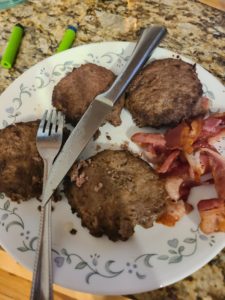
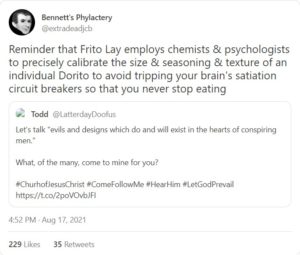 They don’t care about you. They just want you to keep mindlessly stuffing your face, and then going to the “healthcare” system to keep you miserably alive so you can stuff your face with some more. But that post is about more than food, so go
They don’t care about you. They just want you to keep mindlessly stuffing your face, and then going to the “healthcare” system to keep you miserably alive so you can stuff your face with some more. But that post is about more than food, so go 